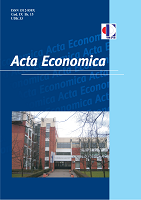ХАРМОНИЗАЦИЈА ИНДИРЕКТНИХ ПОРЕЗА У БИХ СА СТАНДАРДИМА ЕУ У ФУНКЦИЈИ ЕКОНОМСКОГ РАСТА
HARMONISATION OF INDIRECT TAXES IN BiH WITH EU STANDARDS IN THE FUNCTION OF ECONOMIC GROWTH
Author(s): Dinka AntićSubject(s): Business Economy / Management, Economic policy, EU-Approach / EU-Accession / EU-Development, Fiscal Politics / Budgeting
Published by: Економски факултет Универзитета у Бањој Луци
Keywords: tax reforms; indirect taxes; value added tax (VAT); excise taxes;
Summary/Abstract: The paper aims to present the guidelines for harmonisation of the indirect tax policy in BiH with EU standards in order to contribute to fiscal consolidation in the tax area and economic growth of BiH. The analysis of determinants of tax reforms in BiH has shown that the complex fiscal architecture of BiH, shared competences for indirect and direct taxes between the levels of governments and the tax structure, with a dominant share of indirect taxes, present the main constraints for implementation of comprehensive tax reforms in BiH based on balancing the policy of direct and indirect taxes. The analysis of the legal framework taxation of excises and VAT in the EU, a good practice of member states and ongoing EU tax re-forms, as well as comparison with the Law on VAT in BiH, have shown that the only viable option is the policy of small steps and fine tuning of the system of indirect taxes in BiH. The paper identifies three areas for modification of the indirect tax policy in the process of the European integration. VAT and excise rates policy presents the most sensitive issue for meeting EU standards. In order to save the current regional tax competitiveness BiH should do the following: increase excises on oil only up to the minimal EU rates, slow down the pace of increasing tax on cigarettes and keep the existing VAT rate. The second set of measures relate to the incorporation of new EU rules for taxing services, as well as VAT procedures contributing to the improvement of liquidity and competitiveness of domestic companies, particularly from the service sector. The third area of intervention in the indirect tax policy relates to the position of small and medium enterprises (SMEs), enabling VAT deregistration of those firms that have no more interest in staying in the VAT system. BiH should consider an increase in VAT threshold, at least to the level that would preserve a real value of the threshold. Regardless of the measures chosen by the fiscal authority, the most important is they are not mandatory for SMEs. They should be offered as options for those SMEs which estimate they may benefit from using the proposed schemes of taxation.
Journal: Acta Economica
- Issue Year: 15/2017
- Issue No: 27
- Page Range: 179-202
- Page Count: 24
- Language: Serbian

